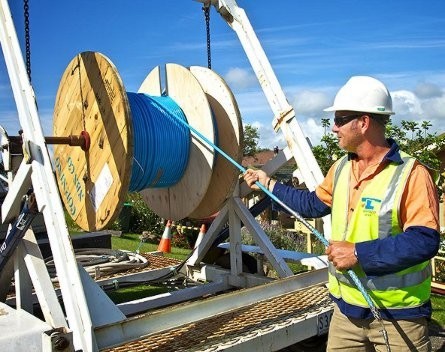
Consumer watchdog the ACCC has issued a statement clarifying the impact of the copper network shut down in 15 communities across Australia, as new figures point to widespread consumer confusion about what the NBN rollout involves.
In a statement, the NBN Co announced small businesses in 15 suburbs and towns across Australia will have copper phone services, ADSL and Telstra cable switched off from May 23.
The suburbs and towns affected are Armidale, Minnamurra and Kiama Downs in New South Wales; South Morang and Brunswick in Victoria; Townsville, Aitkenvale and Mundingburra in Queensland; Deloraine, George Town, Kingston Beach, Sorell, St Helens and Triabunna in Tasmania.
The NBN Co also warns other towns and suburbs are scheduled to have fixed-line services switched off over the coming months.
These include Toowoomba (August) and Aspley (September) in Queensland; Coffs Harbour (July) and Gosford (October) in New South Wales; Bacchus Marsh (October) in Victoria); Gunghalin (July) in the ACT; South Hobart (September), Midway Point, Scottsdale and Smithton (October) in Tasmania.
NBN Co notes transitions to the national broadband network aren’t automatic, and has posted maps of the affected areas on its official website, where business owners are urged to contact their internet service provider to discuss their options.
SMEs using an EFTPOS terminal, fax or alarm system are asked to contact the provider of that service (for example, their security company for an alarm) in order to find out which NBN services support their device. Meanwhile, building owners with an emergency lift phone or fire indicator panel are asked to register it with the NBN Co on 1800 687 626 ahead of the transition.
Following the announcement, the ACCC issued a statement of its own, clarifying that a number of legal safeguards exist exempting some consumers and businesses from disconnection from the existing copper network.
The exemptions include businesses that have placed an order for NBN services but the connection process hasn’t been completed, and when specialist business services (e.g. as EFTPOS or alarm systems) are not yet supported by the NBN. Exemptions also exist for new premises built within six months of the copper shut down date.
The announcements come amidst widespread confusion about the NBN cutover, according to figures recently commissioned by internet service provider iiNet.
The figures show 67% of respondents think switching from copper to NBN is optional, while 62% believe their copper landline will remain connected even if they don’t switch to the NBN.
Further, 19% of respondents did not know they could choose their internet service provider for the NBN, with 20% believing the NBN Co itself would retail services. A further 38% of respondents were unaware that both phone and broadband services are delivered over the NBN.
Overall, 41% of respondents said they had very little awareness about what the transition involves.
In a statement, iiNet product manager Rachael McIntyre said the levels of confusion were surprising four years into the rollout of the project.
“The biggest surprise was that more than two thirds of these broadband users were not aware that moving to fibre is compulsory,” McIntyre said.


COMMENTS
SmartCompany is committed to hosting lively discussions. Help us keep the conversation useful, interesting and welcoming. We aim to publish comments quickly in the interest of promoting robust conversation, but we’re a small team and we deploy filters to protect against legal risk. Occasionally your comment may be held up while it is being reviewed, but we’re working as fast as we can to keep the conversation rolling.
The SmartCompany comment section is members-only content. Please subscribe to leave a comment.
The SmartCompany comment section is members-only content. Please login to leave a comment.